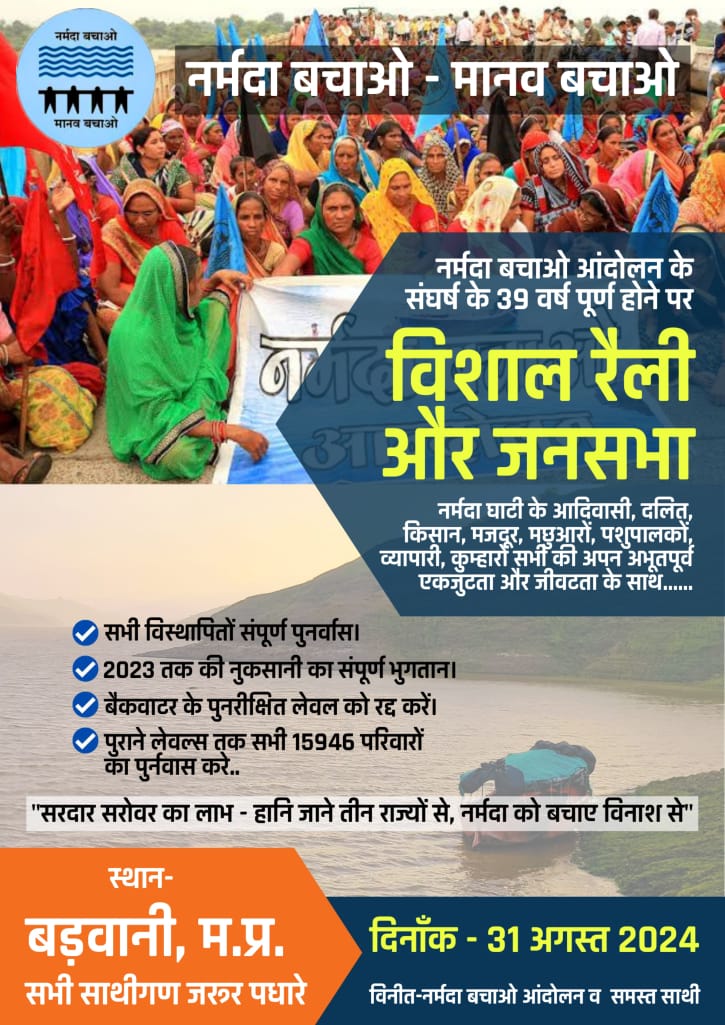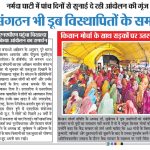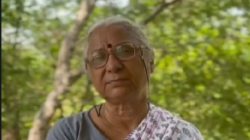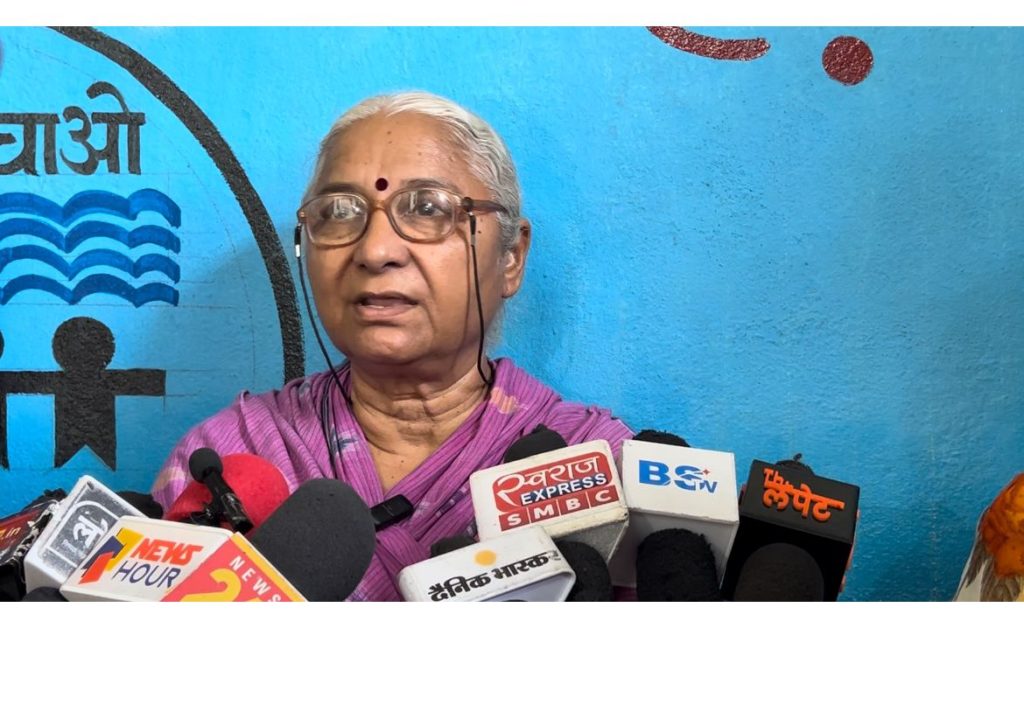21 Green Nobel Prize Winner extend solidarity to the struggle of Narmada Bachao Andolan and write letter to Mr. Narendra Modi, Prime Minister of India.
More than 50 International organisations extend solidarity, ask PM to intervene and stop drowning or forced evictions of more than 40000 families in Narmada Valley.
New Delhi | August 07, 2017: People and organisations from 30 countries have now extended support to ongoing struggle for justice in the Narmada valley. Since July 27th, 12 project affected people including a Medha Patkar are sitting on an indefinite fast demanding complete and just rehabilitation of more than 40000 families facing threat of submergence due to increased height of Sardar Sarovar Dam to 138.68 meters.
21 Goldman environmental prize winner also known as Green Nobel Prize in a collective letter urged Prime Minister Modi to intervene immediately and ensure the fundamental rights of life and livelihood of the people in a democratic country.
Earlier Noam Chomsky, a renowned social critic and philosopher, had extended his support and signed the online petition asking PM of India to rehabilitate the people of Narmada Valley first. The Petition has been signed by people of more than 30 countries from all over the world which also includes many social, environmental, human rights, farmers organisation and others. Some of the key groups include Asian Peasant Coalition, Association for India’s Development, Earth International, World Rainforest Movement, The Asian Human Rights Commission, Rivers Without Boundaries International Coalition, Landless Workers Movement – Brazil, International Working Group for Indigenous Affairs – Copenhagen, Denmark and many others.
The letter mentions that the government has closed down the gates of Sardar Sarovar Dam on 16 June 2017 without completing the rehabilitation of more than 40000 families in Narmada Valley. The rehabilitation sites are in poor state and lack the basic amenities that needs to be provided as per the Narmada water disputes Tribunal award.
Madhya Pradesh government is acting against the People’s interest by taking selective interpretation of Supreme Court judgement came out on 8 February 2017 and continuously trying to forcefully evict people without ensuring the rehabilitation of more than 40000 families. In absence of basic facilities and house plots at rehabilitation sites, MP government has built tin shades for temporary resettlement. Government is trying to shift families residing in Narmada Valley to tin shades which is inappropriate and unable to accommodate a whole family, livestocks and tools being used by people. No judgment have ever talked about providing temporary settlement.
The MP Government, Gujarat government, and Government of India does not seem serious at all to ensure the rights of people and rehabilitation of thousands of families residing in the Narmada Valley. Till now, The Government has not initiated any communication with the people sitting on fast for the issues of incomplete rehabilitation although the chief minister of Madhya Pradesh Shivraj Singh Chauhan showed his concerns about the health of the people sitting on fast on Twitter along with Uma Bharti, the cabinet minister of Ministry of Water Resources.
****************************************************************************************
Letter to Prime Minister of India for Justice in Narmada Valley
August 04, 2017
To
Mr. Narendra Modi
Prime Minister of India
7, Race Course Road
New Delhi, India
Dear Hon’ble Prime Minister Narendra Modi,
We are representatives of civil society organisations from many countries writing to you to draw your urgent attention on the struggle for justice by the communities affected by the Sardar Sarovar (Narmada) Dam.
You are well aware about the criticality of the situation, with dam gates closed last month and 40,000 families, who are yet to be rehabilitated, are facing an imminent submergence later this month, or early September. While the state governments have failed to comply with the orders of the Supreme Court, relying on false information, the authorities have sanctioned closure of the dam gates. From newspapers and reports from the ground we learn that the state police have been called in to the villages to enforce evictions, even if it required force to be used.
Sir, you are well aware that forced evictions without adequate rehabilitation is contrary to many of the agreements the Republic of India has signed, including Universal Declaration of Human Rights. Apart from the statues and guidelines from UN bodies, such a scenario would likely violate international best practices, safeguarding the rights of individuals, particularly women, children and the marginalised.
We have been following the three decade old, non-violent, Gandhian Narmada Bachao Andolan (NBA – Save Narmada Movement) the past many years. Taking on the World Bank, which funded the dam in 1985, it helped the Bank review and strengthens its social and environmental safeguard policies and accountability mechanisms. As we write to you, we learn that 12 people, including its senior activist Medha Patkar are on an indefinite fast since July 27. It is disturbing to hear that no senior government official has reached out to them yet for talks.
We support the demands of NBA that submergence should not be allowed until every family is adequately rehabilitated with all basic amenities. While the exact number of people to be rehabilitated is yet to be ascertained, an independent body identifying them would be the first step towards rehabilitation for all. It is appalling to note that while thousands of complaints of the ones moved to the rehabilitation sites – on absence of amenities, bad quality of land and failure to recognise people as oustees, the state governments have got away ‘rehabilitating’ 40,000 families on paper.
Sir, as the Prime Minister of world’s largest democracy, we hope that you will rise to the occasion, with act with all urgency it calls for; to stop the human rights abuses happening the villages of Narmada.
Signed by:
INDIVIDUALS :
- Albena Simeonova, Europe, Goldman Prize Winner , 1996
- Anna giordano, Italy, Goldman Prize Winner
- Cath Wallace, New Zealand, Goldman Prize Winner, 1991
- Desmond D’Sa, Africa, Goldman Prize Winner, 2014
- Edward Loure Ole Parmelo, Tanzania, Goldman Prize Winner
- Heffa Schuecking, urgewald, Germany, Goldman Prize winner 1994
- Ignace Schops, Beligium, Goldman Prize Winner
- Ikal Ang’elei, Friends of Lake Turkana, Goldman Prize Winner
- Jadwiga Lopata, Poland, Goldman Prize Winner
- John Sinclair AO, Australia, Goldman Prize Winner, 1993
- Juan Pablo Orrego S., Chile, Goldman Prize Winner, 1997
- Luis Jorge Rivera-Herrera, Puerto Rico, Goldman Prize Winner, 2016
- Michal, Slovakia, Goldman Prize Winner, 1990
- Leng Ouch, Cambodia, Goldman Prize Winner
- Nat Quansah, Goldman Prize Winner
- Prafulla Samantara, Goldman Environmental Prize 2017
- Randall Arauz, Central and South America, Goldman Prize Winner, 2010
- TarcísioFeitosa, Brazil, Goldman Prize Winner, 2016
- Ursula Sladek, Germany, Goldman Prize Winner 2011
- Yuyun Ismawati, Indonesia, Goldman Environmental Prize 2009
- Zuzana, Slovakia, Goldman Prize Winner
- Akshay Kayumov, Ecological Cenet Dront, Russia
- Alan Pdber, VT, USA
- Alexey Zimenco, Biodiversity Conservation Centre, Moscow
- Alyansa Tigil Mina, Alliance Against Mining, Phillippines
- Anitra Nelson, Honorary Associate Prof. At RMIT University, Melbourne, Australia
- Anuradha Mittal, The Oakland Institute, USA
- Aravinda, Association for India’s Development
- Arun Aaron, SIAAP
- Ayesha DSouza, International Rivers, USA
- Badri Subedi, Indreni Social Development Forum- Nawalparasi, Nepal
- Bishnu Awasthi, Forum for Local Development, Kanchanpur, Nepal
- Bruce Rich, Washington DC, USA
- Bruno Van Peteghem, Paris, France
- R.H. Clanahan, South Africa
- Camille Chalmers, PAPDA, Haiti
- Catherine Blake, Council of Canadians, Mississippi Mills Chapter, Almonte, Canada
- Cathwallace, New Zealand
- Claudia Campero, Mexico
- David Barkin, Prof at Distinguido Universidad Autinoma Metropolitana – Xochimilco, DF, Mexico
- Defne Gonenc, Switzerland
- Deo Narayan Yadav, Kosi Victim Society, Saptari, Nepal
- Doug Hellinger, The Development GAP
- David Szanton, University of California, Berkeley, USA
- Dudhnath Gupta, Gandak River Control Struggle Committee, Nepal
- Edward Loure Ole Parmelo, Tanzania
- Elaine Zuckerman, Gender Action, USA
- Ercan Ayboga, Turkey
- Gabrielle Engh, Langenberger
- J K Canepa, New York Climate Action Group
- Jai Sen, World Social Forum, USA
- Jelson Garcia, Indonesia
- Jill McManus, NYC Grassroots Alliance, USA
- Jitendra Yadav, Kosi Victim’s Society, Rajbiraj Saptari, Nepal
- Joan Martinez Alier, Prof ICTA – Universitat Autonoma de Barcelona, Barcelona
- Johan Frijns, Bank Track
- Jyotish Kumar Yadav, Kosi Victim’s Society, Rajbiraj Saptari, Nepal
- K Sudhir, People’s Architecture Commonwealth
- Kenji Ago, Japan
- Krishna Yadav, Kosi Victim’s Society, Rajbiraj Saptari, Nepal
- Larry Lohmann, The Corner House, UK
- MabroukaM’ Barek, former elected member of Tunisian Constituent Assembly
- Maercia Andrews, Rural Women’s Assembly, Southern Africa
- Malav Kanuga, Common Nations Press, Brooklyn, NY, USA
- Mike Levien, USA
- Nadia Johanisova, Economy and Society Trust, Brno, Czech Republic
- Nathaniel Don Marquez, Asian NGO Coalition
- Nicholas Hildyard, The Corner House, UK
- Nick Meynen, Global Policies and Sustainability
- Patty Heffley, Former Board of Directors, Pacificia Foundation
- Prawin Kumar Yadav, Kosi Victim’s Society, Rajbiraj Saptari, Nepal
- Martin Mantxo, Basque Country
- Professor Michel Pimbert, Uinited Kingdom
- Rabin Ghimire, Saptkoshi High Dam Struggle Committee, Sunsari, Nepal
- Ratan Bhandari, West Seti Dam Affected Community, Bajhang, Nepal
- Rigine Richter, UrgewaldBuro, Berlin, Germany
- Rishi Raj Lumsali – Mahakali River and Border Concern Group, West Nepal
- Saline, Germany
- Sam Pillai, Toronto, Canada
- Samir Mehta, International Rivers South Asia
- Sarath Agustio Rini, Indonesia
- Sarath Sexton, The Corner House, UK
- Sarawan Chaudhary, Kosi Victim’s Society, Rajbiraj Saptari, Nepal
- Sayandeb Chowdhury, Kosi Victim’s Society, Rajbiraj Saptari, Nepal
- Shalmani Guttal, Focus on Global South, Bankok
- Siti Maimunah, Mining Advocacy Network, Indonesia
- Sukhdev Chaudhary, Kosi Victim’s Society, Rajbiraj Saptari, Nepal
- Tabang, Indonesia
- Tarcisio Feitosa, Brazil
- Tchenna, Movement of People affected by Dam, Brazil
- Thulsy Narayanasamy, UK
- Tim Kejra Perempuan, Indonesia
- Toshiyuki Doi, Japan
- Wenonah Hauter, USA
ORGANISATIONAL
- Adivasi Koordination, Germany
- Amnesty International
- Ana Emilia Poienaru
- Association for India’s Development
- ATTAC Morocco, Member of the SADTM Network
- ATTAC, Argentina
- Bank Information Center, USA
- Chile Sustainable Foundation, Chile
- Coalition Against the Rockaway Pipeline
- Community Empowerment and Social Justice Foundation,
- Democracy Center
- Earth International
- Ecologistas en Accion (Espana)
- Ekologistak Martxan, Basque Country
- Environmental Justice Team
- Focus on the Global South
- Food and Water Watch, USA
- Friends of the Earth International
- Gender Action Global Advocacy Organisation, USA
- Groupe International de Travail pour les peoples Autochtones
- Human Rights Watch
- Instituto Pacs – Instituto Politicas Alternativas Parao Cone Sul, Brazil
- International Work Group for Indigenous Affairs, Copenhagen, Denmark
- JA Justica Ambiental, Foe, Mozambique
- La Asamblea Veracruzana da Iniciativas Ambiental (Lavida), Mexico
- LANDLESS WORKERS MOVEMENT (MST) – BRAZIL
- Mesopotamia Ecology Movement
- NGO Forum on ADB
- Non Timber Forest Products Exchange Programme, Asia
- Non Timber Forest Products Exchange Programme, India
- Observatorio de Multinacionales en America Latin – Paz con Dignidad, Spain
- OT Watch and Rivers Without Boundaries, Mongolia
- Rainforest Relief, New York, USA
- Rivers Without Boundaries International Coalition
- Sierra Club, USA
- Society for Threatened Peoples, Germany
- The Asian Human Rights Commission
- The Elisabeth Haub Law School Student Chapter of National Lawyers Guild
- The Karen Environmental and Social Action Network, Myanmar
- The Palestinian Land Defense Coalition
- Transnational Institute
- WoMin, South Africa
- War on Want, UK
- Waterkeeper Alliance, Bangladesh
- World Rainforest Movement






